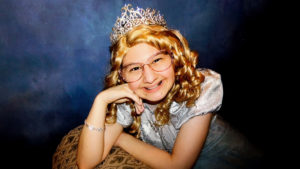Among the sea of longform true crime to be reported over the past few years, one story stands out: Gypsy Blanchard and the murder of her mother, Dee Dee, has gripped the imaginations of journalists, storytellers, and true crime addicts ever since Michelle Dean wrote about it for Buzzfeed in 2016. Tonight is the premiere of The Act, Hulu’s first true crime anthology series (a la FX’s American Crime Story), which stars Joey King and Patricia Arquette in a dramatic reimagining of the Blanchards and their bizarre, tragic history.
Gypsy Blanchard was tiny and wheelchair-bound, afflicted by a laundry list of illnesses both physical and mental, ranging from muscular dystrophy to Leukemia. Her teeth were rotten, her eyesight and hearing were impaired, she had a feeding tube. Dee Dee Blanchard was Gypsy’s devoted, full-time caretaker—a single mother with a generous spirit. Not to mention, the pair were Katrina refugees who had relocated to Springfield, Missouri. They were perfect for the evening news, a tale of mother and preteen daughter persevering through adversity; it earned them charity trips and celebrity notice.
Until Dee Dee Blanchard was found dead on her bedroom floor.
Things weren’t how they seemed, it turned out, between the sick little girl and her doting mom. Less than 48 hours later, Gypsy was found in Big Bend, Wisconsin, sans wheelchair, with a man she had met on the internet—her boyfriend and accomplice in the murder of her mother. The truth surfaced: Gypsy was not sick, nor was she a child. She was nearly 24, and the years of hospitals and surgeries and treatments—of false and unnecessary medical procedures—were all inflicted by Dee Dee.
The bizarre and disturbing story of abuse and deception is being written, produced, and co-showrun by Michelle Dean, alongside crime writer Nick Antosca. It marks the first time longform reporting is being adapted for the screen by the journalist herself, and it joins a growing canon of stories exploring the ravages of a psychological disorder called Munchausen Syndrome by Proxy, in which “a caregiver makes up or causes an illness or injury in a person under his or her care.” The intersection of two ever-popular narrative trends, “sick lit” and the psychological thriller, makes it ideal terrain for crime fiction, and The Act promises to be one of the biggest shows of the year. In advance of tonight’s premiere, let’s catch up on everything you should know.
First and foremost
The show is based on Michelle Dean’s BuzzFeed investigative piece.
Michelle Dean, a journalist and critic, wrote “Dee Dee Wanted Her Daughter To Be Sick, Gypsy Wanted Her Mom Murdered,” which first charted the complete, complex story of deceit in 2016.
An interview with the showrunners
Michelle Dean and co-showrunner Nick Antosca peel back the layers of psychology and illness—the emotional experiences of both abuser and abused, mother and daughter—that make up this story. They discuss the focus in the writers’ room on uncovering the emotional logic, exploring the inner lives of the characters, and elucidating the elements of the mother-daughter relationship that are both alien and relatable.
“‘True Crime Addict’ and the Serious Problem of Internet Sleuth” by Michelle Dean
Dean critiques amateur—and often crowdsourced—investigative work, which, on speculation alone, has muscled its way into the public imagination, often swaying popular opinion about a case in one way or another. James Renner’s 2016 book, True Crime Addict: How I Lost Myself in the Mysterious Disappearance of Maura Murray, she says, “embodies every problem that arises when online obsessives are infected with delusions of detective grandeur.” Renner’s brazen insensitivity points to the desire to dramatize detective work, prioritizing the spectacle of the case above truth. Dean’s understanding and insight into the true crime boom as we know it bodes well for The Act, which will delve into the story’s emotional experiences, since, after all, the case has already been solved.
“The Secrets of Vera Caspary, the Woman Who Wrote ‘Laura’” by Michelle Dean
Before Laura, the beloved 1944 noir directed by Otto Preminger, there was a book of the same name by Vera Caspary, a woman “who does not, for one moment in her long, unusual life, seem to have imagined herself a victim of anyone or anything.” Dean resurrects Caspary’s hard-working, unpretentious, and political career—and reminds us that Preminger gutted the character Laura in his adaptation.
More on Dee Dee and Gypsy Blanchard
Mommy Dead and Dearest (HBO)
Writer and filmmaker Erin Lee Carr’s critically-acclaimed HBO documentary draws out the Southern Gothic narrative, illuminating the pageantry and pretexts that not only made room for the abuse, but silenced an entire community. Featuring exclusive in-person interviews with Gypsy, the documentary draws on home videos, text messages, and medical records to shine light on the messy tangle of lies that made and destroyed the Blanchards’ lives. We also learn about Gypsy’s boyfriend, Nick Godejohn, and the unconventional-bordering-on-disturbed nature of their relationship.
“‘Would you kill my mother for me?’: a dark case of abuse and revenge” by Erin Lee Carr
This concise account of the murder of Dee Dee Blanchard was published in the months after Carr’s documentary was released. In a courtroom interview, Gypsy is asked to describe her mother: “If I had to say one word about her it would be… overprotective.”
An interview with Erin Lee Carr
Turns out Carr, who was developing a true crime series with HBO, had only planned to do a single episode on Gypsy. But her journalistic spirit was stroked upon learning that Gypsy was potentially facing the death penalty, and Carr couldn’t stop investigating.
On Munchausen Syndrome by Proxy (MSbB)
This 10,000 word article from 2004 explores the rise of MSbB and chronicles the cornerstone cases since the disorder was recognized in 1951 by a British physician (only a few years after the National Health Service was established).
Sickened by Julie Gregory
This painful memoir of child abuse by one of today’s leading experts on Munchausen by Proxy details a mother’s manic commitment to her daughter’s imaginary illnesses, telling of the countless doctors visits and invasive procedures, as well as the lengths her mother went to ensure her sickness behind closed doors, coaching her to exaggerate her symptoms, feeding her erratic doses of prescription medication, and forcing her to perform intense physical labor—all while giddily hopped up on medical attention.
In Books/TV/Movies

Sharp Objects by Gillian Flynn
Without giving too much away, Flynn’s lauded debut and contemporary classic (which was adapted into an HBO miniseries in 2018) gives Munchausen center stage. Journalist Camille Preaker returns to her hometown to investigate a series of child murders, and uncovers the truth about her own family’s twisted history in the process.
Everything, Everything by Nicola Yoon
17-year-old Maddie has never left her house. Diagnosed with a rare disease that makes her hyper-susceptible to viruses and bacteria, the only way to stay safe is to stay inside. But when she falls in love with the boy next door, she’s willing to risk her life—and something potentially even more devastating: the truth about her mother’s more insidious motivation for keeping her home.

The Bridge
Saga Noren, the protagonist of BBC’s 4-season Scandi-noir TV series, and her little sister were raised under the iron hand of MSB. The final two seasons dive deep into the long-term psychological effects of the abusive childhood, which only one sibling escapes.

Phantom Thread
It’s a less clear cut case, as far as a complex and ambiguous syndrome like Munchausen goes, but director Paul Thomas Anderson nonetheless cites the disorder as inspiration for his 2017 tale of art, control, and love, which explores the inversion of power when one party is reduced to a feeble and needy state, and the other takes on the role of caretaker.





















